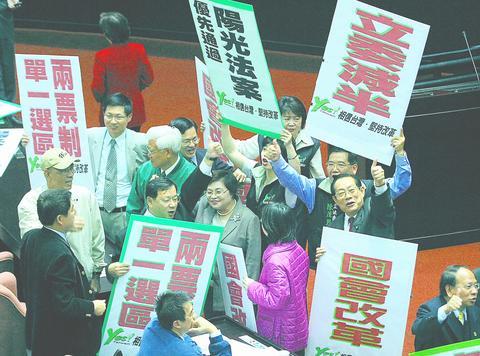The Legislative Yuan yesterday agreed to vote next week -- one day before the presidential election -- on a bill that would slash in half the number of seats in the 225-member parliament.
But several opposition lawmakers accused the Democratic Progressive Party (DPP) of rushing the decision on a major constitutional revision to attract voters in the March 20 presidential poll.
Legislative caucuses yesterday morning reached agreement that the constitutional amendment would get its second and third reading on March 19.

PHOTO: WANG YI-SUNG, TAIPEI TIMES
The caucuses also demanded that the Constitutional Amendment Committee expedite the process for reviewing other articles, including one that would abolish the National Assembly, which convenes only when constitutional reforms or national boundary changes have been passed by the legislature by a three-quarters majority or when a move to impeach the president or vice president has been passed by a two-thirds majority.
The legislature also agreed to hold an additional session on March 18 to discuss the bill governing political donations.
The Constitutional Amendment committee approved a draft bill on Wednesday that said parliament should be reduced to 113 seats in 2008.
It also agreed that legislators' terms should be extended from three years to four.
Meanwhile, Chinese Nationalist Party (KMT) Legislators Apollo Chen (陳學聖) and Hsu Chung-hsiung (徐中雄), and People First Party (PFP) Legislator Sheu Yuan-kuo (許淵國) have started a petition drive to cancel the decision to vote on the amendment.
"We want all the articles to be fully discussed and reviewed by the Constitutional Amendment Committee first," Chen said regarding the purpose of the petition.
"Rushing the article through before March 20 is irresponsible and amounts to breaking the political speed limit," Hsu said.
"Many legislators disagree with the constitutional amendment, but they are too afraid to speak up. The real problem with the legislature does not lie in the number of seats, but rather in its quality, and to improve the quality, we should focus on the election system and constituency," he said.
Some DPP legislators agreed that it is necessary to pass all the constitutional amendments in the committee before sending them back to the legislature, and that the legislative reform should be more comprehensively discussed, but they still supported passing the articles before the election.
"The article that was passed on Wednesday was not comprehensive enough. The committee did not consult the experts' opinions The legislative procedure for the amendment is problematic," said DPP legislator Chen Chin-te (
"Although I think the current articles can be improved, I would still like to have the article on halving the legislative seats passed before the election, otherwise there is no knowing what will happen to the amendment," said DPP Legislator Lee Wen-chung (
Although Lee attended Chen, Hsu and Sheu's press conference, he did not sign their petition.

NATIONAL SECURITY THREAT: An official said that Guan Guan’s comments had gone beyond the threshold of free speech, as she advocated for the destruction of the ROC China-born media influencer Guan Guan’s (關關) residency permit has been revoked for repeatedly posting pro-China content that threatens national security, the National Immigration Agency said yesterday. Guan Guan has said many controversial things in her videos posted to Douyin (抖音), including “the red flag will soon be painted all over Taiwan” and “Taiwan is an inseparable part of China,” while expressing hope for expedited “reunification.” The agency received multiple reports alleging that Guan Guan had advocated for armed reunification last year. After investigating, the agency last month issued a notice requiring her to appear and account for her actions. Guan Guan appeared as required,

A Vietnamese migrant worker yesterday won NT$12 million (US$379,627) on a Lunar New Year scratch card in Kaohsiung as part of Taiwan Lottery Co’s (台灣彩券) “NT$12 Million Grand Fortune” (1200萬大吉利) game. The man was the first top-prize winner of the new game launched on Jan. 6 to mark the Lunar New Year. Three Vietnamese migrant workers visited a Taiwan Lottery shop on Xinyue Street in Kaohsiung’s Gangshan District (崗山), a store representative said. The player bought multiple tickets and, after winning nothing, held the final lottery ticket in one hand and rubbed the store’s statue of the Maitreya Buddha’s belly with the other,

‘NATO-PLUS’: ‘Our strategic partners in the Indo-Pacific are facing increasing aggression by the Chinese Communist Party,’ US Representative Rob Wittman said The US House of Representatives on Monday released its version of the Consolidated Appropriations Act, which includes US$1.15 billion to support security cooperation with Taiwan. The omnibus act, covering US$1.2 trillion of spending, allocates US$1 billion for the Taiwan Security Cooperation Initiative, as well as US$150 million for the replacement of defense articles and reimbursement of defense services provided to Taiwan. The fund allocations were based on the US National Defense Authorization Act for fiscal 2026 that was passed by the US Congress last month and authorized up to US$1 billion to the US Defense Security Cooperation Agency in support of the

CLASSIFIED BRIEFING: The ministry said the special budget focuses on building a comprehensive defense system and strengthening the domestic defense industry The Ministry of National Defense yesterday released information on seven categories of weapons systems to be procured under a stalled NT$1.25 trillion (US$39.57 billion) special defense budget, including precision artillery, long-range missiles, air defense anti-tank missiles and more than 200,000 uncrewed aerial vehicles (UAVs). The Executive Yuan approved a draft version of the budget on Nov. 27 last year and submitted it to the legislature for review. The legislature’s Foreign Affairs and National Defense Committee yesterday invited Minister of National Defense Wellington Koo (顧立雄) to deliver a classified briefing and answer questions at a closed-door session. Koo said he hoped to provide lawmakers